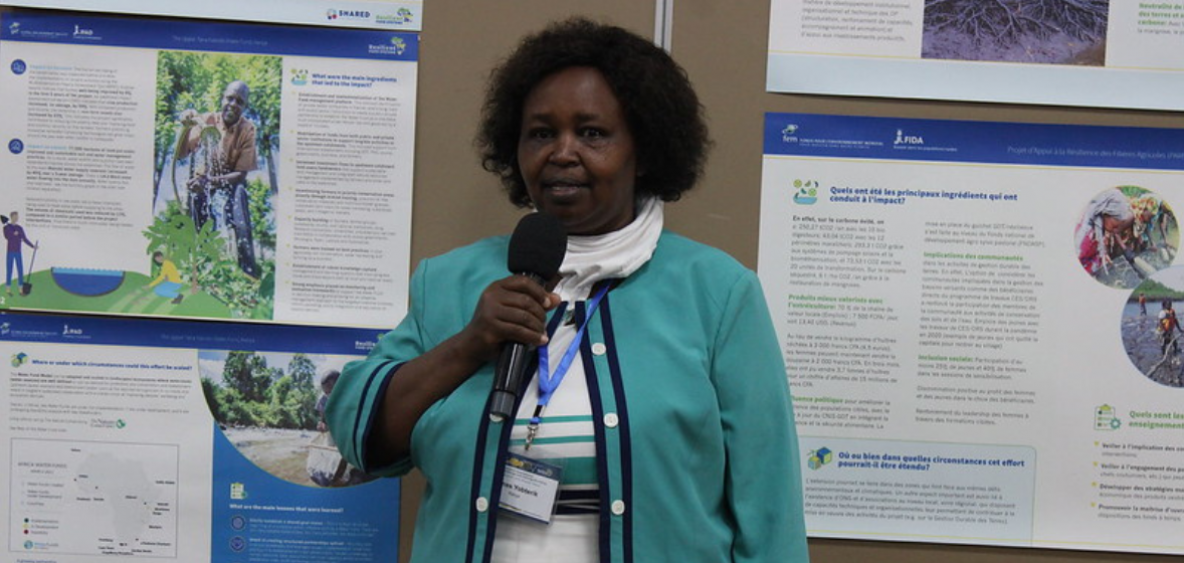 Agnes Yobterik, Director of Programmes, Projects and Strategic Initiatives, Ministry of Environment and Forestry, Kenya, presents at the 2022 RFS Knowledge Exchange & Learning Workshop. (credit: Felix Malamula, ERASP-PRIDE)
Agnes Yobterik, Director of Programmes, Projects and Strategic Initiatives, Ministry of Environment and Forestry, Kenya, presents at the 2022 RFS Knowledge Exchange & Learning Workshop. (credit: Felix Malamula, ERASP-PRIDE) Taking advantage of the UTNWF’s presence in Malawi in September 2022, the Blantyre-Mulanji Water Fund hosted the RFS Kenya team for a four-day knowledge exchange.
The Upper Tana-Nairobi Water Fund (UTNWF) is Africa’s very first water fund, but it certainly won’t be its last.
Led by the International Fund for Agricultural Development (IFAD) and the Nature Conservancy (TNC), the UTNWF has left the establishment stages that formed the Resilient Food Systems (RFS) Kenya project and as of September 2021 is fully operational and independent.
Due to their huge successes, the UTNWF has garnered considerable attention in the international arena, not least in guiding the development of additional water funds across the continent of Africa. The budding Blantyre-Mulanji Water Fund (BMWF) in Malawi is one of them.
Seizing on the opportunity that was presented when the UTNWF team visited Blantyre to attend the 2022 RFS Knowledge Exchange and Learning Workshop in September 2022, BMWF Steering Committee leaders invited them to visit the catchment sites and provide guidance on a four-day extended stay.
“[This was] an opportunity for Kenya to share her knowledge and lessons on establishing a water fund noting that the South to South collaboration would afford both countries to share homegrown solutions for mutual benefit,” said Agnes Yobterik, Director, Programmes, Projects and Strategic Initiatives, Ministry of Environment and Forestry, Kenya. The opportunity to engage in south-south learning was not one they were going to turn down.
The UTNWF team toured focal points throughout the 890 ha Mudi catchment, noting entry points like reestablishing forest cover and promoting sustainable land management among the countless smallholder farms. In addition, the urban and peri-urban environments that comprise Blantyre city encroach on the Mudi river and contribute to pollution and bank instability.
Representatives from the Mulanje Mountain Conservation Trust and the Malawi Department of Forestry accompanied the team for on-site discussions on and around Mulanje Mountain, which supplies 10-15% of water to the city of Blantyre. The participants noted current land use practices like extensive tea farms and hazards like the extremely dry conditions that make the area prone to fire in the dry season.
Catchment-level management is not a new concept in Malawi, as the Enhancing the Resilience of Agro-ecological Systems Project (ERASP), or RFS Malawi, has been working alongside the Programme for Rural Irrigation Development (PRIDE) to scale sustainable land management for the benefit of catchment residents and irrigation infrastructure downstream. PRIDE is a governmental programme, so they know it works, the question is how to scale it from the smaller areas that PRIDE works in, to larger areas, and make it self-sustaining.
“South to South collaboration [is] an excellent window to complement the traditional North to South expression of collaboration and partnerships among countries from the south interested in sharing, learning and exploring our complementary strengths,” shared Agnes Yobterik. “Especially with emerging challenges like food security and climate change.”
Having hosted Uganda for an exchange visit in 2019, UTNWF knows that these exchanges benefit all parties. The bottom line? “Homegrown and tested south-to-south solutions in our horizontal contexts,” says Agnes Yobterik.
Through this exchange of knowledge, the UTNWF was able to see first-hand what context BMWF is working in, and provide their observations, lessons and recommendations based on their own first-hand experiences. Now that the UTNWF is independent, operating with support from the private and public sectors, the team is spreading the word to other emerging funds in Kenya, and on the World stage.
Subscribe to our monthly newsletter to receive updates on stories directly from the field across all our projects, upcoming events, new resources, and more.